 Petzlover
PetzloverKuvasz is originated from Hungary but Mixed is originated from United States. Kuvasz may grow 34 cm / 13 inches shorter than Mixed. Kuvasz may weigh 60 kg / 132 pounds lesser than Mixed. Kuvasz may live 8 years less than Mixed. Kuvasz may have less litter size than Mixed. Both Kuvasz and Mixed requires Moderate Maintenance.
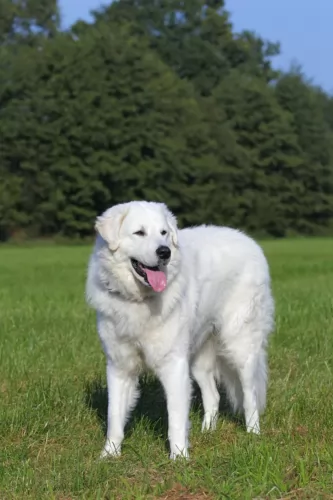 The Kuvasz is an ancient dog breed from Hungary. It is believed that the dog is the oldest of the ancient Hungarian dog breeds, and in fact a fossilized skeleton dating back to the 9th century, and almost identical to the modern Kuvasz, was found near Keszthely.
The Kuvasz is an ancient dog breed from Hungary. It is believed that the dog is the oldest of the ancient Hungarian dog breeds, and in fact a fossilized skeleton dating back to the 9th century, and almost identical to the modern Kuvasz, was found near Keszthely.
During the 15th century the Kuvasz became very sought after, being found in royal courts. Puppies were given as royal gifts. Later the popularity of the breed waned and then it was found in its traditional role of guarding livestock.
As Kuvasz numbers dwindled, breeding efforts were started but it is believed that other large dogs such as the Great Pyrenees were used with the Kuvasz to continue with the breeding programs.
In 1884, the first Hungarian standard for the breed was written. It was in 1966 that the Kuvasz Club of America was established.
Many people are inclined to think that mixed breed or cross-breed dogs, also known as mutts or mongrels or designer dogs are just pavement specials. They think they look nothing much better than junkyard mutts.
This may be so, but not always, and these mixed breed dogs always seem to have hearts of gold. A Mixed breed is a dog that has parent’s who aren’t registered and who come from different breeds. In other words the parents aren’t of the same breed.
Guessing a cross breed’s ancestry can be difficult as these mixed-breeds have more genetic variation than pure breeds. They've been around since ancient times. The dogs originate in different countries and they all have different coats, different sizes and different temperaments.
It is sad but true – there are literally millions of mixed dogs worldwide, some of which never know what it is to live with- and be lovingly cared for by a human being.
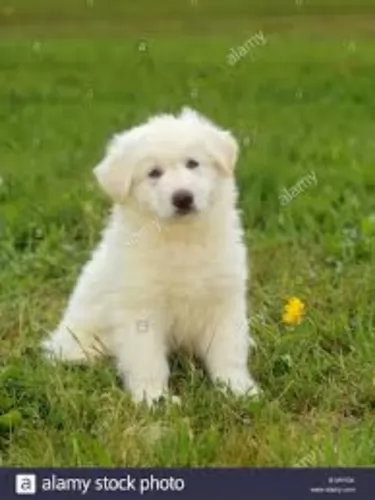 The beautiful Kuvasz is a large, muscled dog standing at 65 – 76cm in height and weighing 35 – 52kg. He has a double coat of dense white hair which can be straight or wavy.
The beautiful Kuvasz is a large, muscled dog standing at 65 – 76cm in height and weighing 35 – 52kg. He has a double coat of dense white hair which can be straight or wavy.
It is natural for the dog to lose most of the long coat during the Summer months. In other words this dog has a seasonal coat.
The nose is black, the eyes brown and alert, the ears are of medium length and floppy and the tail is carried long and low.
The Kuvasz is an intelligent dog who will benefit from training and socialization. It is always wise to have large dogs like this trained because just his size can cause problems if he isn’t obedient.
He is also described as a clownish type of dog which means he’ll entertain and amuse you. Certainly he is playful as a puppy but he calms down quite a bit as he grows into maturity. He is independent, and those who have owned such a dog report that he can be loving and loyal with his human family, wanting to guard and protect them. Others will say that he tended to be aloof, even with his human family.
Used as working dogs, the Kuvasz has learned to be independent and they will need a firm, strong owner who is also fair with them, otherwise they just do their own thing. They’re active dogs and because of their size they won’t suit city living where there is a tiny garden.
Sometimes Mixed dog breeds come about from two dogs meeting on the streets and mating or it could be two pure-breeds accidentally mating, resulting in a mixed breed.
The mixed breed dog puppy could inherit looks from just the one purebred parent so that he grows up looking like a pure-breed. With a cross breed the standard for breeding isn’t the same for purebreds where the appearance and temperament is more or less the same.
A mixed breed dog doesn’t have these standards to conform to and they are as varied and unique as the colors in the rainbow. It’s not possible to know what a mixed breed dog’s puppies will look like. A typical example of a mixed breed is a Labradoodle. People love the temperament of the Labrador but they want the low shedding qualities of the Poodle as well.
Mixed breed dogs can be small or large and that means different litter sizes. If you don’t want your Mixed dog breed becoming a parent, you can spay or neuter your dog.
There are many people who avoid choosing a ridiculously high priced pure breed puppy and they prefer to choose a mixed breed. This is partly because these mixed breed dogs are healthy, resilient and nearly always a good match for you and your family.
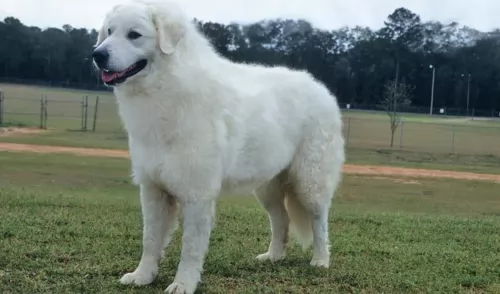 Kuvasz are guarding dogs, they’re intelligent and loyal, making them excellent family dogs with the right training and socialization.
Kuvasz are guarding dogs, they’re intelligent and loyal, making them excellent family dogs with the right training and socialization.
They’re able to get on well with other pets in the home as well as children. He is a beautiful dog and another bonus is that he isn’t particularly high maintenance.
As is common with many other large-breed dogs, he will have a shorter lifespan than what you’d get with a smaller dog breed, but if you feed him high quality food, exercise him and involve him in your activities, this large dog can become a wonderful friend and protector for you.
Doesn’t matter what your Mixed breed dog looks like – he is a unique individual and you can never really predict what kind of a character he will turn out to be.
He might inherit a bit of placid behavior from one parent and a bit of clownish behavior from the other. It’s what makes them so special.
Ask most dog lovers who have owned a mixed breed and you will usually hear them say that they wouldn’t trade their amazing loyal and devoted pet for all the money in the world.
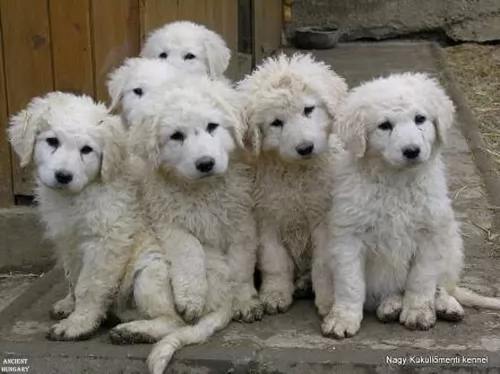 The large Kuvasz is a healthy dog breed that with good care can reach 12–14 years of age. Being the large dog that he is, he may well be prone to bone and joint problems. It is why good nutrition is so important for this dog - feeding him the best food with vitamins and minerals.
The large Kuvasz is a healthy dog breed that with good care can reach 12–14 years of age. Being the large dog that he is, he may well be prone to bone and joint problems. It is why good nutrition is so important for this dog - feeding him the best food with vitamins and minerals.
You know the saying ...you are what you eat... and this applies to dogs too. Good food can help to ward off serious illnesses. Big dogs like this often have to contend with hip dysplasia which can be both painful and debilitating as well as eye diseases.
This is where the eyelid of the dog rolls inwards, causing irritation and pain for the dog. There is also Ectropion, where the eyelid rolls outwards.If you see your pet has a red eye which is watery and which has pus, visit your vet. Entropion surgery will correct and repair and condition.
All dogs, whether pure breeds or mixed breeds, need to be excellently cared for. When you consider the unconditional love your dog gives you, you want to ensure that you’re kind and loving towards him.
Every dog can be prone to common dog illnesses and there are some genetic predispositions for dogs with certain breeds within them.
All dogs can battle with problem teeth, but it appears to be more rife with smaller dogs. Dental disease starts with tartar build-up and when it isn’t removed from the teeth it progresses towards infection of the gums and teeth.
What you need to know is that not caring for the teeth can mean your pet losing his teeth but also putting your dog in danger of joint disease and problems with the kidneys and heart.
Obesity is a huge factor in small- and large dogs and can pave the way for other diseases with your pet. Being obese can shorten the life of your pet because it contributes to heart disease, digestive disorders, back pain and joint problems.
Fleas, ticks, mites and worms can play havoc with the health of your pet. Some of these parasites can then be transmitted from your pet to you. Parasites can cause pain, weight loss and even death for your pet so it is important to be vigilant in these matters.
Bloat, when the stomach twists and fills with gas as well as cancer and heart disease are just some of the more common diseases to look out for.
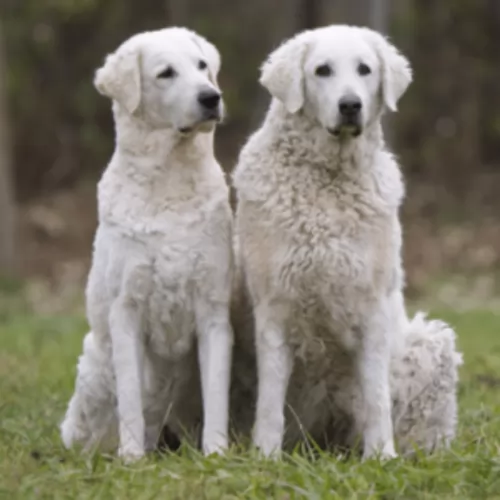 The coat may be fairly long and thick but it doesn’t require any special kind of grooming. A good brush twice a week will be adequate and will help with getting rid of stubborn knots and matting.
The coat may be fairly long and thick but it doesn’t require any special kind of grooming. A good brush twice a week will be adequate and will help with getting rid of stubborn knots and matting.
He is a seasonal shedder and this frequent brushing will make sure the coat remains groomed and shiny.
The Kuvasz is a hardy breed who just loves the outdoors. He is a dog that doesn’t do well in the heat. Make absolutely sure that he has a cool, sheltered spot where he can lie down. Ensure that there is always a bowl of fresh, cool water available to him.
There is quite a bit of conflict and controversy regarding nutrition in dogs. The idea is to keep it simple. If you buy a commercially manufactured dog food, check the ingredients on the packaging.
You want to be sure your pet is getting vitamins and minerals in instead of preservatives, fillers and colorants. Try and give him some home made food too such as some chicken, brown rice or pasta and some vegetables. You can mix this into his dry kibble occasionally with a little bit of raw meat too when you have.
Avoid feeding your dog things such as chocolates, nuts, onions, sweets and chips.
Good nutritious food, exercise, grooming, a dry place to sleep, taking your pet to the vet when he is sick as well as plenty of love and attention will ensure your Mixed dog breed’s health and happiness.
Keep die diet of your pet simple and consistent to avoid digestive problems. Quality commercially manufactured food is a good choice. Boiled chicken, brown rice and cooked or raw vegetables will be excellent added into your dog’s kibble from time to time. Add in some raw meat occasionally as it is good for warding off skin diseases.
Exercise your pet regularly, but don’t overdo it with young dogs as it can lead to joint problems later on in life.